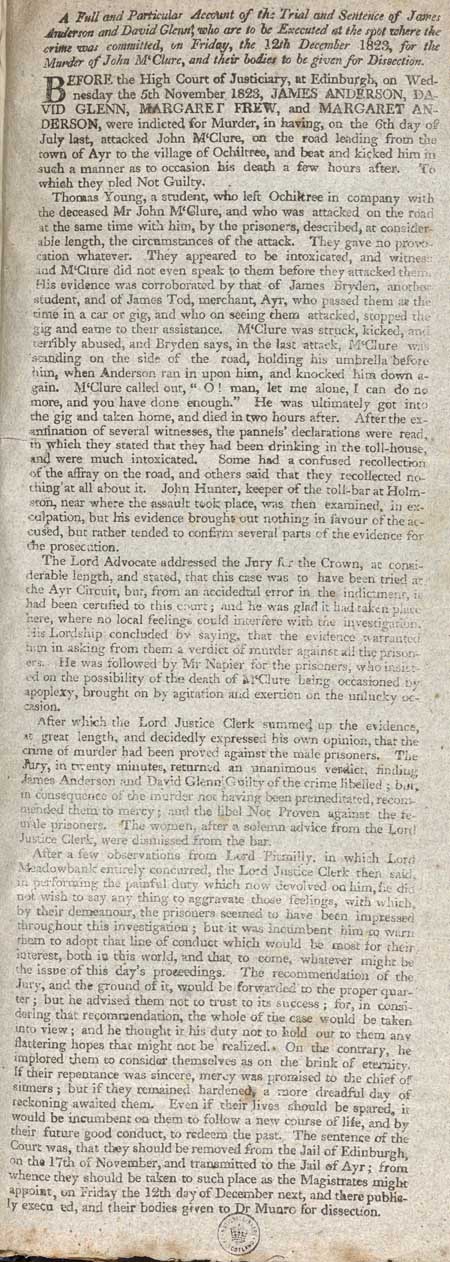Transcription
A Full and Particular Account of the Trial and Sentence of James
Anderson and David Glenn, who are to be Executed at the spot where the
crime war committed, on Friday, the 12th December 1823, for the
Murder of John M'Clure, and their bodies to be given for Dissection. BEFORE the High Court of Justiciary, at Edinburgh, on Wed-
nesday the 5th November 1823, JAMES ANDERSON, DA-
VID GLENN, MARGARET FREW, and MARGARET AN-
DERSON, were indicted for Murder, in having, on the 6th day of
July last, attacked John M'Clure, on the road leading from the
town of Ayr to the village of Ochiltree, and beat and kicked him in
such a manner as to occasion his death a few hours after. To
which they pled Not Guilty. Thomas Young, a student, who left Ochiltree in company with
the deceased Mr John M'Clure, and who was attacked on the road
at the same time with him, by the prisoners, described, at consider
able length, the circumstances of the attack. They gave no provo
cation whatever. They appeared to be intoxicated, and witness
and M'Clure did not even speak to them before they attacked them
His evidence was corroborated by that of James Bryden, another
student, and of James Tod, merchant, Ayr, who passed them at the
time in a car or gig, and who on seeing them attacked, stopped the
gig and eame to their assistance, M'Clure was struck, kicked, and
terribly abused, and Bryden says, in the last attack M'Clure was
standing on the side of the road, holding his umbrella before
him, when Anderson ran in upon him, and knocked him down a-
gain. M'Clure called out, " O ! man, let me alone, I can do no
more, and you have done enough." He was ultimately got into .
the gig and taken home, and died in two hours after. After the ex-
amination of several witnesses, the pannels' declarations were read
in which they stated that they had been drinking in the toll-house,
and were much intoxicated. Some had a confused recollection
of the affray on the road, and others said that they recollected no-
thing'at all about it. John Hunter, keeper of the toll-bar at Holm-
ston, near where the assault took place, was then examined, in ex-
calpation, but his evidence brought out nothing in favour of the ac-
cused, but rather tended to confirm several parts of the evidence for
the prosecution. The Lord Advocate addressed the Jury for the Crown, at consi-
derable length, and stated, that this case was to have been tried at.
the Ayr Circuit, but, from an accidendtal error in the indictment, it
had been certified to this court; and he was glad it had taken, place'
here, where no local feelings could interfere with the investigation.'
His Lordship concluded by saying, that the evidence.warranted'
him in asking from them a verdict of murder against all the prison-
ers. He was followed by Mr Napier for the prisoners, who insist-
ed on the possibility of the death of M'Clure being occasioned by
apoplexy, brought on by agitation and exertion on the unlucky oc-
casion. After which the Lord Justice Clerk summed up the evidence,
At great length, and decidedly expressed his own opinion, that the
crime of murder had been proved against the male prisoners, The
Jury, in twenty minutes, returned an unanimous verdict, finding
James Anderson and David Glenn Guilty of the crime, libelled ; but
in consequence of the murder not having been premeditated, recom-
mended them to mercy; and the libel Not Proven against the fe-
male prisoners. The women, after a solemn advice from the Lord
Justice Clerk, were dismissed from the bar. . After a few observations from Lord-Picmilly. in which Lord
Meadowbank entirely concurred, the Lord Justice Clerk then said,
in performing the painful duty which now devolved on him,he did
not wish to say any thing to aggravate those feelings, with which,
by their demeanour, the prisoners seemed to have been impressed
throughout this investigation ; but it was incumbent him to warn
them to adopt that line of conduct which would be most for their
interest, both in this world, and that, to come, whatever might be
the issue of this day's proceedings. The recommendation of the
Jury, and the ground of it, would be forwarded to the proper quar-
ter ; but he advised them not to trust to its success ; for, in consi-
dering that recommendation, the whole of the case would be taken
into view; and he thought it his duty not to hold our to them any
flattering hopes that might not be realized. On the contrary, he
implored them to consider themselves as on the brink of eternity.
If their repentance was sincere, mercy was promised to the chief of
sinners; but if they remained hardened a more dreadful day of
; reckoning awaited them. Even if their lives should be spared, it
would be incumbent on them to follow a new course of life, and by
their future good conduct, to redeem the past. The sentence of the
Court was, that they should be removed from the Jail of Edinburgh,
on the 17th of November, and transmitted to the Jail of Ayr; from
whence they should be taken to such place as the Magistrates might
appoint, on Friday the 12th day of December next, and there public-
ly execn ed, and their bodies given to Dr Munro for dissection.
View Commentary | Download PDF Facsimile
|
 |
Date of publication:
1823 shelfmark: F.3.a.13(60)
 View larger image
View larger image
|


